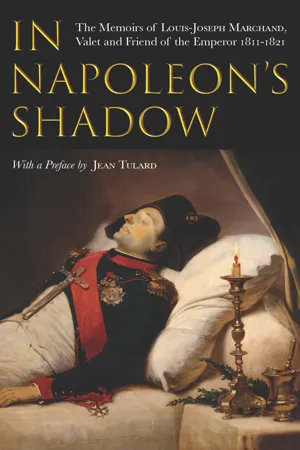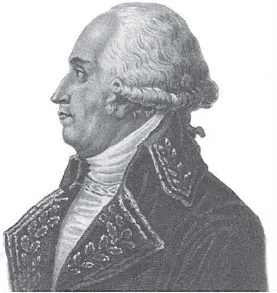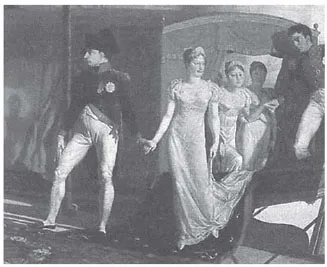
eBook - ePub
In Napoleon's Shadow
The Memoirs of Louis-Joseph Marchand, Valet and Friend of the Emperor, 1811–1821
- 832 pages
- English
- ePUB (mobile friendly)
- Available on iOS & Android
eBook - ePub
In Napoleon's Shadow
The Memoirs of Louis-Joseph Marchand, Valet and Friend of the Emperor, 1811–1821
About this book
In 1811, twelve young men were chosen among the families in the Emperors personal service to serve as ushers in his apartments. My mother, attached to the household of the King of Rome as first nurse to the prince, requested this favour for me from the grand chamberlain, the Count de Montesquiou, and it was granted.Louis-Joseph Marchands intimate memoir of his time as Napoleons valet is the last of the significant Napoleonic manuscripts to be translated into English and a unique and precious insight into the last days of Napoleons Imperial project.Serving alongside the Emperor from the apex of his reign and through his eventual demise, Marchand depicts, in remarkable detail, the Russian campaign, the campaigns of Germany and France, Napoleons exile to Elba and subsequent escape, his defeat at Waterloo.Friend and confidante to the leader, Marchand was beside him at the Tuileries during the Hundred Days, and he was present to hear Napoleons last words, France my son the army on the island of St Helena.This sincere and authentic testimony from a man with nothing to hide, nothing to apologise for is both a meticulous historical record and a fresh personal perspective on Napoleon.In this work, Tulard remarks in his preface, the Emperor speaks freely. Listen..Marchand presents the somewhat familiar history of the Emperor's decline as completely new territory through conversations, fond stories and personal encounters'.'Marchand's memoirs, republished in English for the first time in two decades, represent a truly irreplaceable contribution to Napoleonic scholarship. Beyond the Emperor as commander and conqueror, Marchand, from his privileged vantage point, illuminates Napoleon the man in rich and absorbing detail.' - John H Gill
Frequently asked questions
Yes, you can cancel anytime from the Subscription tab in your account settings on the Perlego website. Your subscription will stay active until the end of your current billing period. Learn how to cancel your subscription
No, books cannot be downloaded as external files, such as PDFs, for use outside of Perlego. However, you can download books within the Perlego app for offline reading on mobile or tablet. Learn how to download books offline
Perlego offers two plans: Essential and Complete
- Essential is ideal for learners and professionals who enjoy exploring a wide range of subjects. Access the Essential Library with 800,000+ trusted titles and best-sellers across business, personal growth, and the humanities. Includes unlimited reading time and Standard Read Aloud voice.
- Complete: Perfect for advanced learners and researchers needing full, unrestricted access. Unlock 1.4M+ books across hundreds of subjects, including academic and specialized titles. The Complete Plan also includes advanced features like Premium Read Aloud and Research Assistant.
We are an online textbook subscription service, where you can get access to an entire online library for less than the price of a single book per month. With over 1 million books across 990+ topics, we’ve got you covered! Learn about our mission
Look out for the read-aloud symbol on your next book to see if you can listen to it. The read-aloud tool reads text aloud for you, highlighting the text as it is being read. You can pause it, speed it up and slow it down. Learn more about Read Aloud
Yes! You can use the Perlego app on both iOS and Android devices to read anytime, anywhere — even offline. Perfect for commutes or when you’re on the go.
Please note we cannot support devices running on iOS 13 and Android 7 or earlier. Learn more about using the app
Please note we cannot support devices running on iOS 13 and Android 7 or earlier. Learn more about using the app
Yes, you can access In Napoleon's Shadow by Louis-Joseph Marchand in PDF and/or ePUB format, as well as other popular books in History & 19th Century History. We have over one million books available in our catalogue for you to explore.
Information
PART ONE
Marchand’s Beginnings in the Service of the Emperor
FROM THE TRIP TO HOLLAND (1811) TO THE ESTABLISHMENT
ON THE ISLAND OF ELBA (MAY 1814)
CHAPTER ONE
Entry into the Emperor’s service — Trips to Dresden and Holland — Campaign of Russia and Malet conspiracy — 1813 campaign in Saxony
In 1811, twelve young men were chosen among the families in the Emperor’s personal service to serve as ushers in his apartments. My mother, attached to the household of the King of Rome as first nurse to the prince, requested this favor for me from the grand chamberlain, the Count de Montesquiou,11 and it was granted.
The Emperor was then happy, at the peak of his glory. He had just had a son12 whose birth fulfilled all his ambitions; he saw before him the establishment of his lineage while he was still young. He had the vision and the hope of placing his son’s throne out of reach of the dangers which threatened his power daily.
The court was brilliant, with festivities, balls, shows, small trips, and hunts rapidly following each other. The former nobility sought the honor of attending the court, of being admitted to the Emperor’s household, and serving the state in administration or the army. It was welcomed and obtained what was within the Emperor’s power to grant it: honors and positions. The new nobility did not see this without some jealousy, but it knew the Emperor in the army, and there, only merit was rewarded. It was to be under the battle flags that duty and honor, valor and glory, led to a fusion of the old and the new nobility, the fusion of all parties, the Emperor’s primary goal in his plans of glory and prosperity for France. A genius as active as he was powerful, the Emperor for his time had arrived, and was even ahead of it: he promptly replaced anarchy with order, by undoing the disasters of the Revolution.
King Louis, against the Emperor’s wishes, but in the interest of his people whose suffering he knew, had just abdicated as King of Holland.13 The Emperor decided to make the trip. Some time after that, the court went to Compiègne, and Their Majesties left that residence for the kingdom the Emperor had just annexed to France.
Since the Emperor was visiting the country, he arranged to meet the Empress in Antwerp. The princess went, along with her retinue, to the Laeken castle,14 leaving the King of Rome in the care of Countess de Montesquiou. When she arrived in Laeken, she made several excursions in the vicinity, visiting manufacturing facilities and the Brussels theater, and purchasing a considerable amount of lace, which the Emperor had suggested, in order to bring new business to those factories that were encountering bad times. Everywhere she went, she was greatly welcome.15
In the meantime, the Emperor was visiting the entire northern coast from Boulogne to Flessingue, where he had ordered some construction work. While on board the Charlemagne, he was detained there for three days, without being able to go ashore because of violent winds; some persons in his retinue, who had gone on board small ships, met with great danger.16
The Empress left Laeken to join the Emperor in Antwerp; Their Majesties remained in that city a few days, visiting public establishments and attending festivities given in their honor, and left. Antwerp after witnessing in a shipyard the launching of a vessel into the Escaut.17
The Emperor left town, letting the Empress proceed to Gorcum, where he rejoined her.18 The various armed forces under the command of Marshal Oudinot were under arms, in spite of heavy rain; the Emperor reviewed them. When he returned, although wet, he granted audience to the town officials. The governor of the kingdom, arch-treasurer Lebrun,19 Duke of Plaisance, had come to town to greet Their Majesties.
From Gorcum, the Emperor and Empress proceeded to Amsterdam, via Workum.20

Lebrun. Third Consul of the French Republic.
They made a solemn entry into Amsterdam.21 The Empress rode in a multipaned carriage, with an honor guard around her. The Emperor was on horseback, surrounded by a brilliant general staff, and was deliriously cheered by the entire population which had turned out to see him. The notables of the city, tradesmen and others, were surprised to see the Emperor speaking to everyone in his own terms, appearing to be perfectly aware of their interests, concerned with their needs, and not at all foreign to any of the details he knew would please them.22
During the entire time the Emperor and Empress remained in Amsterdam, there were nothing but parties and excursions. In the absence of the Emperor, who had gone to Texel,23 the Empress went to visit the village of Broek,24 whose streets form a kind of mosaic upon which carriages could not ride. An exception was made for her Majesty, who was taken to the mayor’s house; she was shown the door, which was only opened for christenings, weddings, or deaths. The Emperor also went to Saardam,25 to visit the cabin where Peter the Great lived while he was studying shipbuilding.

The Emperor and Empress arrive in Holland.
During this trip, the Emperor and Empress were one day on a yacht; he went up to the helmsman, questioned him, and asked if the boat belonged to him. “Not at all,” he replied; “if it were mine, I would consider myself very fortunate.”
“Well, I am giving it to you,” the Emperor said to him. The man responded with an incredulous smile, not understanding that the Emperor could give him something not belonging to him, and thus expressed no thanks to him for this. But when grand marshal Duroc summoned him that evening, and handed him the title to the boat and the receipt from its owner, “the man’s joy,” Duroc said to me, “was delirious, and that much more so because he had believed I was making fun of him.” The Emperor said he thought the boat had easily cost him 6,000 francs. It was making a man’s fortune and happiness quite inexpensively.
The Emperor did many similar things, which, he used to say, a sovereign could never do enough of. The people among whom they are done remain more attached to you; they trust that when misfortune strikes, they shall also be rescued in a providential manner.
The voyage was a brilliant one, and French actors came there to put on performances.26 The people in that city missed King Louis, but this did not prevent them from showing their enthusiasm wherever the Emperor appeared. From Amsterdam, Their Majesties proceeded to The Hague, via Haarlem, and visited the port and the settlements. During a new excursion of the Emperor’s,27 the Empress went to the Loo castle,28 where the Emperor joined her. Their Majesties then went to Nimègue and Dusseldorf, and crossed the Rhine in Cologne, where feasts were given in their honor. All the city guilds, carrying banners with the insignia of their professions, paraded below the Empress’ windows, to cries of Long live the Emperor, long live Empress Marie-Louise! All the streets were festooned, decorated with tapestries, greenery, and strings of flowers. After leaving Cologne,29 they proceeded to Dinant. During the night so violent a wind had risen that the pontoon bridge had been carried away. The Emperor wanted to cross, but the local boatmen thought the river too swollen for anyone to attempt a crossing for two or three days. The Emperor knew there were some British sailors garrisoned in the city, and he ordered that the cleverest and strongest of them be brought out. The water was rising constantly, and the current was swift and dangerous. The Emperor asked the sailors if they could join together enough boats to allow his entire convoy to cross the Meuse. They replied it was possible, but risky. His Majesty told them to begin at once. The weather was cold: on the Emperor’s orders, hot wine was made plentiful. In a few hours they built a raft, upon which the Emperor, the Empress, and the retinue first went across. Before the sun was up, the entire convoy had gone across. The Emperor had each man given a full set of clothes, a bonus, and his freedom, with arrangements for them to go to England. There were forty of them. On November 11, Their Majesties arrived in Saint-Cloud, where they rejoined the King of Rome.
France and Russia were at odds, the cause being the military occupation of the Duchy of Oldenburg30 by the Prince of Eckmühl (Davout), on orders from the Emperor. No matter how justified such an occupation was because of the enormous amount of British products being channeled through that country, no matter how much damage the continental blockade established by the Emperor and recognized by Russia suffered because of this, the Emperor considered the invasion by his troops to represent a lack of consideration for a princess of Russian imperial blood. He was about to blame the action taken by his lieutenant and pull out his troops, when a threatening note arrived from the Saint Petersburg cabinet: it demanded the immediate evacuation of the duchy, and the turn-over of Danzig as a free city, in reparation for the occupation of the Oldenburg shoreline. This challenged the honor of France, disrupted the fíne harmony existing between the two powers, and led the Emperor to back the Prince of Eckmühl (Davout) in the position he had just adopted.
The Emperor, concerned with the darkening political horizon, wished to have parties and balls to entertain the Empress and the young ladies at court. The most brilliant party was that given in the theater of the Tuileries palace: quadrilles were organized, and rehearsals took place several days ahead at the small theater in the Empress’ apartments erected for that purpose. The Emperor’s two sisters, both remarkably attractive, took part in this. Princess Pauline came dressed as France, creating an ideal of beauty enhanced by a ravishing costume; over a white tunic, her bosom was covered by a light breastplate covered with golden scales; she wore a light helmet of burnished gold, upon which fluttered a few white feathers; with laced boots on her feet, and a half spear in her hand, she made a most ravishing picture.
The Queen of Naples represented Italy: she wore a red coat embroidered with gold. As she was not as tall as her sister ...
Table of contents
- Cover
- Title
- Copyright
- Dedication
- TABLE OF CONTENTS
- Avant Propos by Proctor Jones
- Preface by Jean Tulard
- Marchand I by Jean Bourguignon
- Memoirs of Marchand II by Jean Bourguignon
- Introduction by Louis-Joseph Marchand
- PART ONE: Marchand’s Beginnings in the Service of the Emperor From the trip to Holland (1811) to the establishment on the Island of Elba (May 1814)
- PART TWO: Marchand’s Beginnings in the Service of the Emperor From the stay in Elba to the hundred days June 1814 to June 1815)
- PART THREE: The Hundred Days
- BOOK TWO:SAINT HELENA
- PART FOUR: Toward Saint Helena, the Briars, Longwood
- PART FIVE: Hudson Lowe
- PART SIX: O’Meara’s Dismissal
- PART SEVEN: Final Struggles
- PART EIGHT: Deliverance
- PART NINE: Last Respects
- Appendix One: by Proctor Jones
- Appendix Two: by Ben Weider
- Bibliography by Henry Lachouque